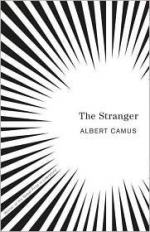|
This section contains 1,701 words (approx. 6 pages at 300 words per page) |

|
Camus' Portrayal of Existentialism in The Stranger
Summary: A discussion of the main character's meetings with the prison chaplain and the magistrate in Albert Camus' The Stranger, and how they reflect Camus' own belief in the futility of religious or spiritual belief.
The basic tenant of existentialism is the doctrine that among sentient beings, specifically human beings, existence takes precedence over essence and that man is totally free and responsible for his acts. As an existentialist, Albert Camus fully believed in the futility of reasoning beyond ones own existence, and mirrored this belief in The Stranger. The Stranger, aptly categorized as one of Camus' three "absurds" (the other two being The Myth of Sisyphus and The Plague), is a tool, used by Camus as a means to an existentialist end. As Meursault wends his way through a pointless existence, his carelessness (or more particularly in his case, his lack of caring) brings him to interact with an overzealous magistrate and a priest who just will not get the point. Camus' careful construction of these interactions is targeted at what to him is a weak and untrue belief: that of religion...
|
This section contains 1,701 words (approx. 6 pages at 300 words per page) |

|


